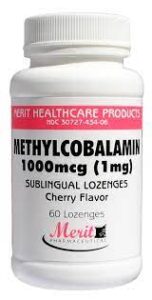
What is Cyanocobalamin, Why Should You Avoid It and What You Should Take Instead of Methylcobalamin?
By Dr. Basheerah
What is Cyanocobalamin?
Cyanocobalamin is a synthetic version of vitamin b-12. It is primarily used as a medication in order to treat and prevent deficiencies of vitamin b-12. Cyanocobalamin both prescribed by your doctor, or accessed OTC. You can often get vitamin b-12 through foods in your diet, but sometimes, certain lifestyle choices and chronic illnesses can impact your body’s ability to absorb vitamin b-12, so your doctor may prescribe cyanocobalamin to assist.
You can also find Cyanocobalamin in many food products that claim to have added vitamins such such as cereals, snack bars, sports drinks, energy drinks, and even baby formula.
Main Uses for Cyanocobalamin
1. Getting vitamin b-12
Some people who experience chronic illnesses such as Crohn’s disease, or adhere to certain diets such as veganism tend to be prone to experiencing vitamin b-12 deficiency. In this case, they may take supplemental Cyanocobalamin to make up for the vitamins they lack. Other’s may

2. Treating anemia
Your body needs vitamin b-12 to create red blood cells. When you have a vitamin b-12 deficiency, your body is not producing the amount of red blood cells needed to maintain homeostasis. This lack of red blood cells can lead to pernicious anemia, which then may require supplements such as cyanocobalamin to assist in bringing red blood cells to a normal amount.
3. Maintaining healthy metabolism
Some studies suggest that a lack of vitamin b-12 is linked to a low metabolism. These studies concluded that being deficient in vitamin b-12 can lead to obesity and high cholesterol levels. This means that taking cyanocobalamin may aid in weight loss by revving up your metabolism.
4. Surgery recovery
When one gets certain surgeries, such as surgery on their colon, one is more prone to experience a temporary deficiency of vitamin b-12. So in addition to any other medication one’s doctor may prescribe post surgery, they may also prescribe supplemental cyanocobalamin to help keep vitamin b-12 levels stable.
Potential Adverse Effects
Although many agree that cyan is an effective way to get your dose of vitamin b-12, many also take some issue with the vitamin due to the it’s contents and its potential side effects.
1. Acute Cyanide Poisoning
There is a cyanide molecule attached to the synthetic cyanocobalamin. Cyanide in high dosage can be deadly because it can cut off oxygen to your mitochondria. This can potentially lead to acute cyanide poisoning if taken in high dosage.

2. Polycythemia
Cyanocobalamin can potentially unmask underlying polycythemia, a condition in which one’s red blood cell count is too high. If somebody has this underlying condition, and begins to take cyan, it may lead to issues such as high blood pressure and blood clots.
Other potential side effects of taking Cyanocobalamin include:
-
Vomiting
-
Potassium deficiency
-
Dizziness
-
Shortness of breath,
-
Rapid weight gain
-
Numbness or tingling and joint pain
-
Fever
-
Swollen tongue
-
Itching or rash
Many doctors do advise their patients to take heed before consistently taking cyanocobalamin to get their vitamin b-12. Some doctors will recommend diet changes, such as consuming more fish, eggs, or dairy. If someone is vegan, a doctor may recommend nutritional yeast or fortified vegan spreads to get their fix of vitamin b-12.
What is Methylcobalamin?
Methylcobalamin is a naturally occurring form of b-12 that can be accessed through supplemental form, or through foods. This naturally occurring compound primarily functions through your liver, brain, and nervous system.

Methylcobalamin has been gaining more popularity as the superior supplemental vitamin b-12 due to the fact that it is naturally occurring, and seems to yield better results in sustaining b-12 levels than its synthetic counterpart. It also appears to be superior in that it also helps with eyesight, aids in melatonin production needed for sleep, and aids in regulating homocysteine levels, which can curb vascular issues such as heart disease or stroke.
Methylcobalamin vs. Cyanocobalamin
Main similarities:
1. Similar Conversion
When you ingest either cyanocobalamin or methylcobalamin, they are both converted into essential vitamin B-12. This makes them both beneficial to those who experience Vitamin B-12 deficiencies, or are looking to boost their vitamin b-12 levels.
2. Alleviating Symptoms of Chronic Illness
Studies show that both cyanocobalamin and methylcobalamin can be useful in reducing symptoms of certain chronic illnesses such as diabetes. Studies have shown that symptoms of diabetic neuropathy, a complication of diabetes that leads to nerve damage, were alleviated effectively when the patient took either methylcobalamin or cyanocobalamin.
Main differences:
1. Synthetic vs Natural
One of the main complaints about cyanocobalamin is that it is a synthetic form of Vitamin b-12, meaning this compound does not naturally occur in nature. Because this compound is man-made, it’s used more frequently in supplements due to its low cost and more stable chemical nature.
On the other hand, methylcobalamin is a naturally occurring compound. This means methylcobalamin can be accessed through supplements as well as through the foods we consume such as meat, fish, eggs, and dairy.
2. Booster vs No Booster
Although many believe that taking methylcobalamin may be more effective than cyanocobalamin, many studies suggest that for the best results, you should take a supplement vitamin such as adenosylcobalamin for the most effective absorption. You typically don’t need to take a booster vitamin for cyanocobalamin, as it is stable enough to absorb effectively by itself.
Whether you get your boost of vitamin b-12 through synthetic, lab-made cyanocobalamin, or organic, naturally occurring methylcobalamin, both supplements are proven to be effective in maintaining vitamin b-12 levels. It is also very important that in addition to taking these supplements, you make sure you are maintaining a healthy, well-balanced diet that is conducive to supporting healthy b-12 levels for your most optimal health.








